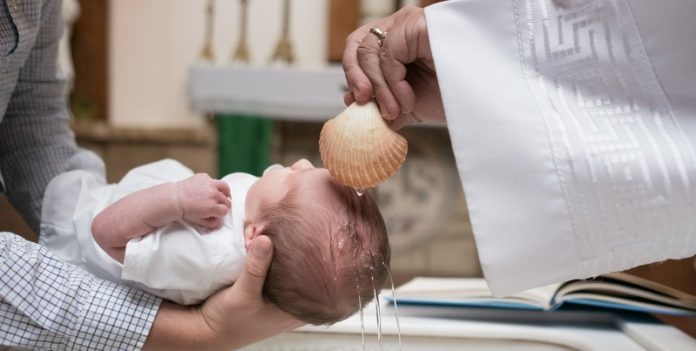
Baptism and the catechist
JONATHAN F. SULLIVAN
The God of power and Father of our Lord Jesus Christ has freed you from sin and brought you to new life through water and the Holy Spirit.” With these words, spoken to the neophytes immediately after their Baptism at the Easter Vigil, the Church professes our belief in the unique power of the sacrament of Baptism.
Baptism has a special significance for catechists, since the truth it bears — salvation through the life, death, and resurrection of Jesus — is the faith we proclaim in our teaching. Understanding our Baptism — and drawing on its graces as a source of inspiration and strength — is a necessity for all who proclaim the Catholic faith to others.
Baptism in sacred Scripture
In the Old Testament, Baptism is prefigured by a number of familiar stories, many of which are mentioned in the blessing of the baptismal water during the Easter Vigil. The Church has as long seen in Noah’s ark a symbol of baptism, for through the ark humanity was saved through the water. That these floodwaters also contained death connects the mystery of Baptism to the mystery of the cross.
The flight of the Israelites through the Red Sea is another Old Testament image of Baptism. In this case, by passing through the waters, the people are saved from death so they might find the freedom to worship God on the other side. (That the Israelites almost immediately turn to the Golden Calf shows the need for ongoing repentance and conversion, even after Baptism!) In the crossing of the Red Sea, we see God’s promise of liberation from captivity and death made manifest, a promise that is renewed and extended to all people in the gift of Baptism.
The Jewish law in the Old Testament also prescribed various cleansings and purifications as part of various religious and cultural rituals. For instance, Jewish law prescribed ritual washings before the Passover, for certain animal sacrifices, and for priests before certain rituals. In all of these, we see a prefigurement of our Christian understanding of Baptism — the cleansing of impurity through water.
Baptism finds its highest point in the Scriptures in Jesus’ encounter with John the Baptist. Being without sin, Jesus did not need to submit to the purification of Baptism, yet he nevertheless chose to symbolize his union with humanity by receiving John’s Baptism. In his Baptism we also see the life of the Trinity made manifest: The Father declares the identity of the Son and anoints him with the Holy Spirit. It is into this life that we, too, are inaugurated at our Baptism.
The nature and effects of Baptism
 Baptism, along with Confirmation and the Eucharist, is one of the Sacraments of Initiation. Indeed, it is the first sacramental step a person takes on their journey to full membership in the Church. As such Baptism lays the foundation for the Christian life. It is “the gateway to life in the Spirit … and the door which gives access to the other sacraments” (CCC, 1213).
Baptism, along with Confirmation and the Eucharist, is one of the Sacraments of Initiation. Indeed, it is the first sacramental step a person takes on their journey to full membership in the Church. As such Baptism lays the foundation for the Christian life. It is “the gateway to life in the Spirit … and the door which gives access to the other sacraments” (CCC, 1213).
Baptism has retained throughout the centuries its essential nature and form: a triple immersion (or pouring of water over the candidate’s head) accompanied by the words “[Name], I baptize you in the name of the Father, and of the Son, and of the Holy Spirit” (see Matthew 28:19). While bishops, priests, and, in the West, deacons are the ordinary ministers of Baptism, anyone — including a non-baptized person — can baptize in an emergency, as long as they follow the proper form and carry the Church’s intention for Baptism (see CCC, 1256).
As the first of the sacraments received by the faithful, Baptism carries with it a host of effects and graces. First is the cleansing of original sin. In the Nicene Creed that we recite at Mass on most Sundays, we proclaim that we “believe in one baptism for the forgiveness of sins.” In the waters of Baptism, we find the complete remission of all sins which came before. The Catechism reminds us that, after our Baptism, there remains “absolutely nothing left to efface, neither original sin nor offenses committed by our own will, nor was there left any penalty to suffer in order to expiate them” (CCC, 978). The forgiveness that comes from Baptism is perfect and complete — such is the gracious gift of God’s mercy.
That is not to say that Christians cannot be tempted or fall back into sin, nor does Baptism remove the temporal consequences of original sin such as suffering and death. The entire Christian life is a training in the virtues and growth in holiness! But Baptism does give us the grace needed to fight the good fight and keep the faith so one day we will enjoy the heavenly banquet (see 2 Timothy 4:7).
Through Baptism, we participate in the Paschal Mystery — the suffering, death, resurrection, and ascension of Christ. As St. Paul so powerfully proclaims, “If we have died with him, we shall also live with him” (2 Timothy 2:11). This phrase may have been part of an early Christian hymn, testifying to the early belief in Baptism’s effects: through the water, we “die” to our old, sinful self and “rise” to life renewed by the resurrection.
In Baptism we also participate in the threefold ministry of Christ as priest, prophet, and king. These three offices — the highest in the Old Testament — find their perfection in the person of Jesus, for he perfectly fulfills their duties. As priest, Jesus offers perfect sacrifices and prayers, culminating with his death on the cross. As prophet, Jesus preaches God’s Word and calls people to repentance and right relationship with the Father. As king, Jesus exercises dominion over heaven and earth, ordering all things.
Baptism is also the first sacrament of communion with the body of Christ. During the Baptism of infants, the priest or deacon greets the parents and child at the entrance of the church, proclaiming that “the Christian community welcomes you with great joy. In its name, I claim you for Christ our Savior.” While this communion with the Church Universal will find its perfection in the Eucharist, it is through Baptism that we belong to the Christian community and enter into the life of the Church.
Baptism and catechists
The aim of catechesis is to form others in an explicit and life-changing faith in Jesus Christ. The General Directory for Catechesis reminds us that “Baptism, the sacrament by which ‘we are configured to Christ,’ sustains this work of catechesis with the help of its grace” (GDC, 80). Through our Baptism, we have been given the gift of faith and charged with sharing it with others.
Catechists can draw on the grace and power of their Baptism in a number of ways. First, remember that, through our Baptism, we are connected to the entire Body of Christ.
As such, we do not teach on our own authority, but by the authority of the Church that has been entrusted to us by virtue of our catechetical ministry. Catechists should take care to pass on the faith as it has been handed to us — not to give our own opinion divorced from what has been revealed by God through Sacred Tradition and Sacred Scripture. Our Baptism should compel us to continually deepen our knowledge of and love for our Catholic faith through study, ongoing formation, and prayer.
In order to fulfill our vocation, catechists also draw on the threefold ministry of Christ into which we have been baptized. As laity participating in the common priesthood (as oppose to the sacramental or ministerial priesthood), we both pray for our students and lead them in prayer. As prophets, we teach the faith and proclaim God’s Word, teaching others to know the Scriptures and God’s plan of salvation. And as kings, we organize lesson plans, manage our classrooms, and communicate with parents in order to maintain an orderly catechetical program. (For more on this, read “Priest, Prophet, and King as a Way of Life” on page 32 of the September 2019 issue of Catechist magazine.)
Finally, through Baptism, we have access to our advocate, the Holy Spirit, through whom we have been given charisms (spiritual gifts) for the benefit of others. When catechesis is enlivened by the Holy Spirit, it transcends mere education and becomes an encounter with the living God. Never be afraid to call on the Holy Spirit for strength and grace!
Jonathan F. Sullivan serves as the director of parish ministries, services, and catechesis for the Diocese of Lafayette-in-Indiana. He blogs at JonathanFSullivan.com.
This article was first published in Catechist magazine, September 2019.
PHOTO: Josh Applegate on Unsplash




